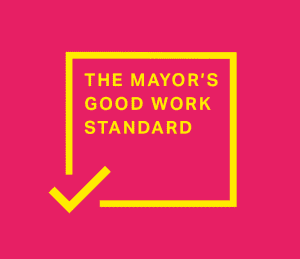Black History Month at Toynbee Hall: Saluting our sisters
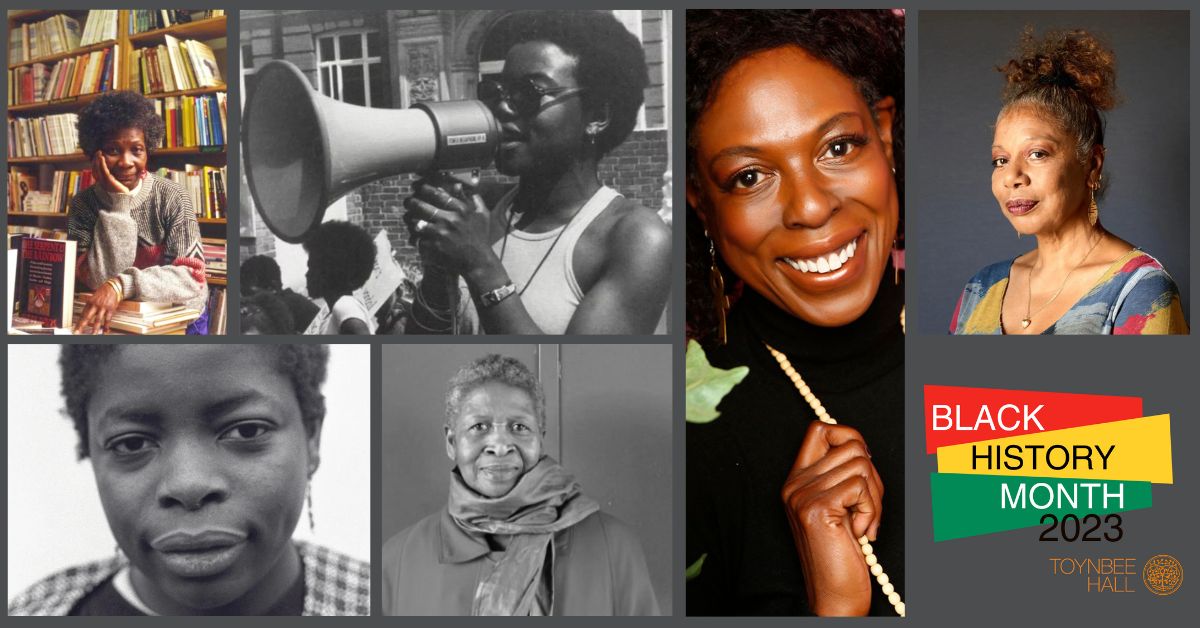
This Black History Month, we celebrate black women icons who fought against injustice
To celebrate Black History Month 2023 this October, women of colour at Toynbee Hall salute our sisters who fought against injustice. Here are their stories:
Olive Morris
Olive Morris was a community activist in South London in the 1970s, who died of cancer aged 27 in 1979. Through her activities organising the black community and feminist activism, she left behind an extraordinary legacy of local activism.
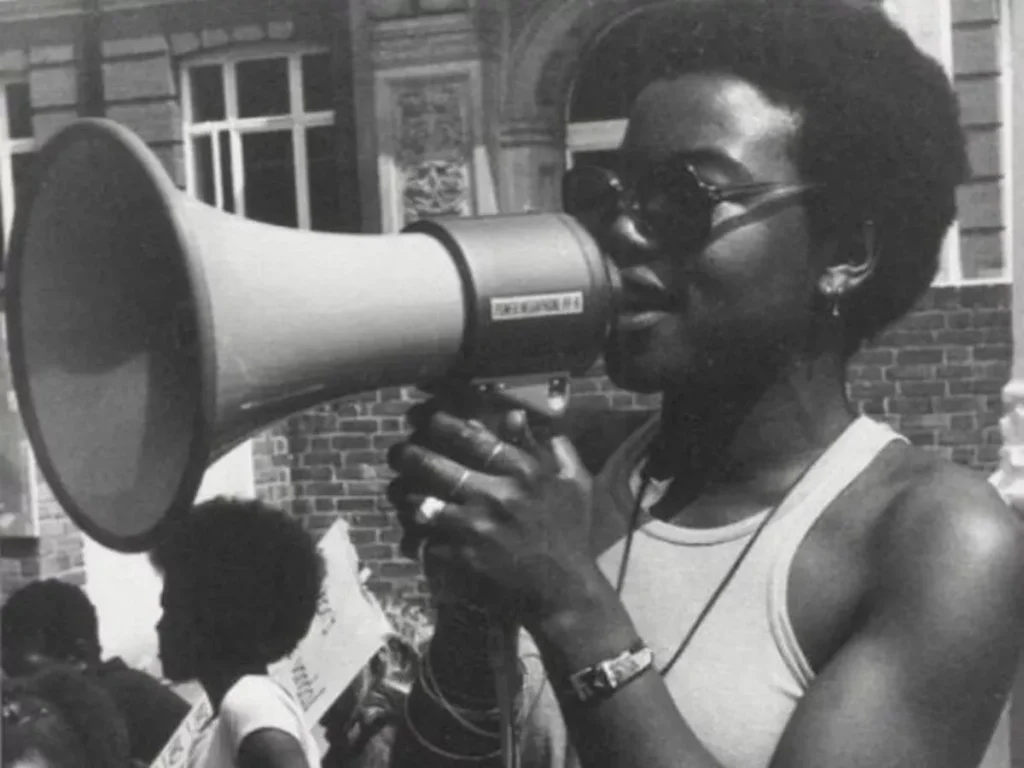
Olive dedicated her life to the struggle for liberation, democracy, and socialism. She became part of the British Black Panther Movement in 1968, of which she became a core member.
She took a degree in social sciences at Manchester University and became involved in community groups in Moss Side and was an active member of the Manchester Black Women’s Cooperative. The struggle of black women was at the heart of her activism; she was the co-founder of the Brixton Black Women’s Group in 1974, and the Organisation of Women of Asian and African Descent (OWAAD). OWAAD is a national, socialist, and activist umbrella organisation that emerged as part of the British Civil Rights Movement.
One of OWAAD’s major accomplishments was its first national Black women’s conference in March 1979. Held in Brixton, the conference had 300 attendees and is considered to be the inception of the Black women’s movement in the country.
Dr Altheia Jones
Originally from Trinidad, Dr Altheia Jones-LeCointe travelled to Britain to complete a PhD in biochemistry at University College London in 1965.
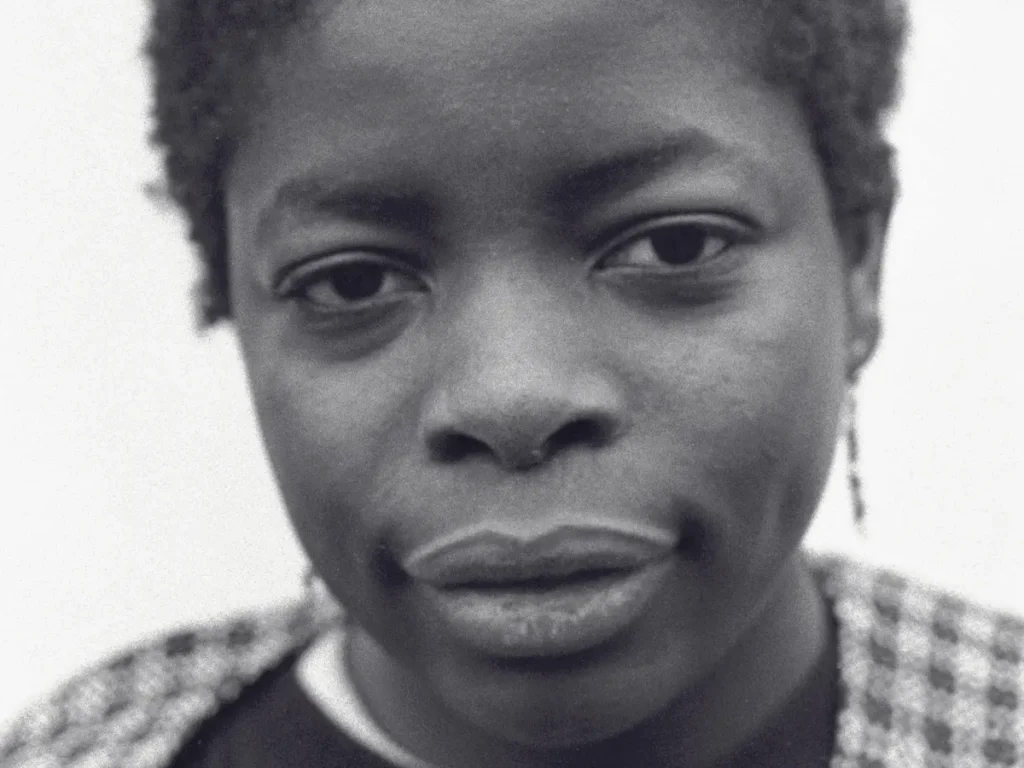
She led the British Black Panther Movement, recruiting thousands from the 1960s onwards, as well as giving talks in schools and teaching classes in anti-colonialism. A staunch defender of women’s as well as racial rights, she developed procedures within the Black Panthers to investigate and punish men suspected of the abuse or exploitation of women.
By the late sixties, an Afro-Caribbean restaurant in Notting Hill called The Mangrove had become a centre for London’s black community, attracting intellectuals, creatives, and campaigners. And so naturally, it was targeted by police under the pretence that it was a “hub of drug activity”.
In 1970, Jones-LeCointe organised a demonstration to protest police mistreatment of The Mangrove. The demonstration was vastly over-policed, with 200 officers deployed for 150 demonstrators, and violence erupted. She was arrested along with eight others, who collectively became known as the Mangrove Nine.
Representing herself at the trial, Jones-Le Cointe used her closing speech to highlight the racism of the Metropolitan Police. Found not guilty of conspiracy to incite a riot, this landmark case marked a turning point in the fight to recognise and remedy systemic racism in British institutions.
The trial marked the pinnacle of the Black Power Movement. Jones-Lecointe continued campaigning with the BPM, which was renamed the Black Workers’ Movement, until 1974. Since it ended, she has divided her time between Trinidad and Britain as a physician, specialising in haematology, and a research scientist.
Mavis Best, MBE
Mavis Best came to the UK from Jamaica in 1961. She trained as a Community Development Youth Worker at the University of London, Goldsmith College, in 1974. She has worked for North Lewisham Project where she set up a supplementary school for African-Caribbean children who were under achieving in schools in the Deptford area.

In 1970s London, police used Section 4 of the 1824 Vagrancy Act to harass black people. The ‘Sus’ law let police stop, search, arrest, detain and assault young black people aged 11 and up – mostly men. Best and a group of black women from Lewisham lobbied the police and the government to scrap this law. It took numerous demonstrations and meetings with Government officials but within 3 years the law was scrapped. This was a major chapter in the Black British fight for civil rights.
Best would continue that struggle for the next three decades. Through the 80s and 90s, she was involved in all manner of grassroots community projects, mainly targeted at helping or strengthening the voices of Black people in Britain, and especially south-east London, where she continued to live.
Invariably, she would be the one who initiated the projects, gathered the support, and extracted funding and commitments from local authorities. She was instrumental in pushing local churches to do more for young people. She was involved in campaigning for justice for those killed by racist attacks in the area in the early 1990s, including Rohit Duggal, Rolan Adams and Stephen Lawrence. She was later part of a panel set up to review the implementation of recommendations laid out in the Macpherson Report – which concluded that “institutional racism” existed in Britain’s police forces.
Best, who died on 14 November aged 83 in December 2022, was awarded an MBE in 2002 for her “services to the community”.
Stella Dadzie
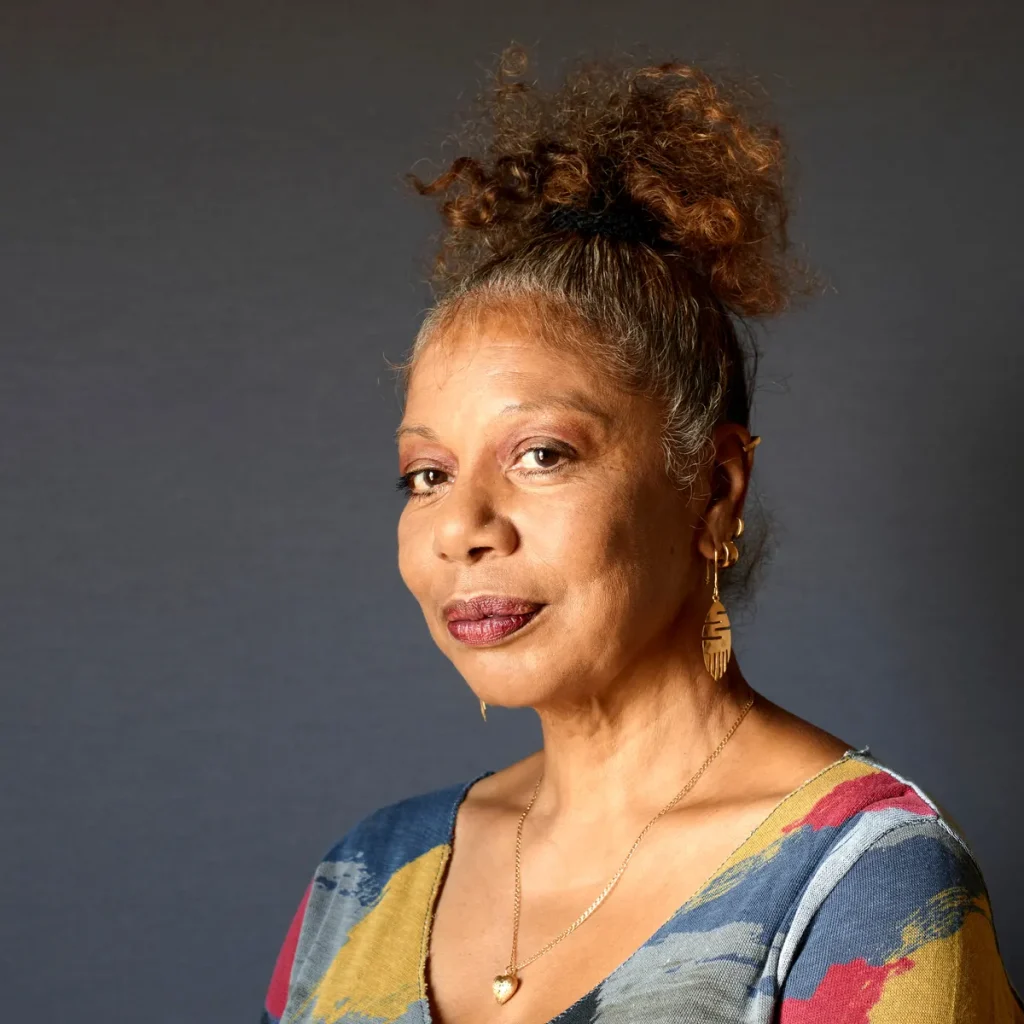
Stella Dadzie is a British educationalist, activist, writer, and historian. Dubbed as a “one of the grandmothers of Black feminism in the United Kingdom”, she’s a founding member of the Organisation of Women of Asian and African Descent (OWAAD) in the 1970’s.
OWAAD organised around several key issues such as domestic violence; immigration and deportation; children’s rights in schools; and anti-Black discrimination and policing. Dadzie and members of OWAAD also joined the campaign to end SUS law, which were stop and frisk laws in England and Wales that were used chronically against Black youth, who police deemed as suspicious. Moreover, OWAAD campaigned and protested for reproductive rights, particularly against the testing of Depo-Provera, a contraceptive drug, on Black, Asian, and other marginalised women.
While OWAAD disbanded in 1983, Dadzie continued in her trailblazing activism. She co-authored, along with Beverley Bryan and Suzanne Scafe, The Heart of the Race: Black Women’s Lives in Britain in 1985. The same year the book was published, it received the Martin Luther King Award for Literature. In 2020, she published a new book: A Kick in the Belly: Women, Slavery & Resistance.
An educator, Dadzie has written numerous essays, reports, and scholarship on anti-racist, inclusive curriculum development and strategies in education, and on challenging and addressing structural inequities in regard to access to education. She is also known for her significant contributions to combating youth racism as well working with racist perpetrators. She has travelled all over the world to help educators implement anti-racist strategies and practices in schools.
Yvette Williams, OBE
Yvette Williams, OBE has a strong track record of delivery and experience in all aspects of leadership at a senior level, specialising in cultural and organisational change, promoting equality and diversity and public and community engagement strategies, for over 30 years.

She lives in Notting Hill and previously worked with the Mangrove Community Association, and she is also a founding member of Operation Black Vote. Yvette was head of Equality and Diversity for the Crown Prosecution Service in London for 14 years, developing hate crime prosecution policies and community engagement strategies.
She is a co-founder of the Justice 4 Grenfell Campaign. The campaign has used a variety of media and strategies to ensure that the Grenfell Tower disaster remains in the public eye. Yvette has been a key speaker at many events. and has written for and has featured in several publications. In September 2020, Yvette featured on an iconic front fold out cover of British Vogue as one of 20 international social justice activists.
Jessica Huntley
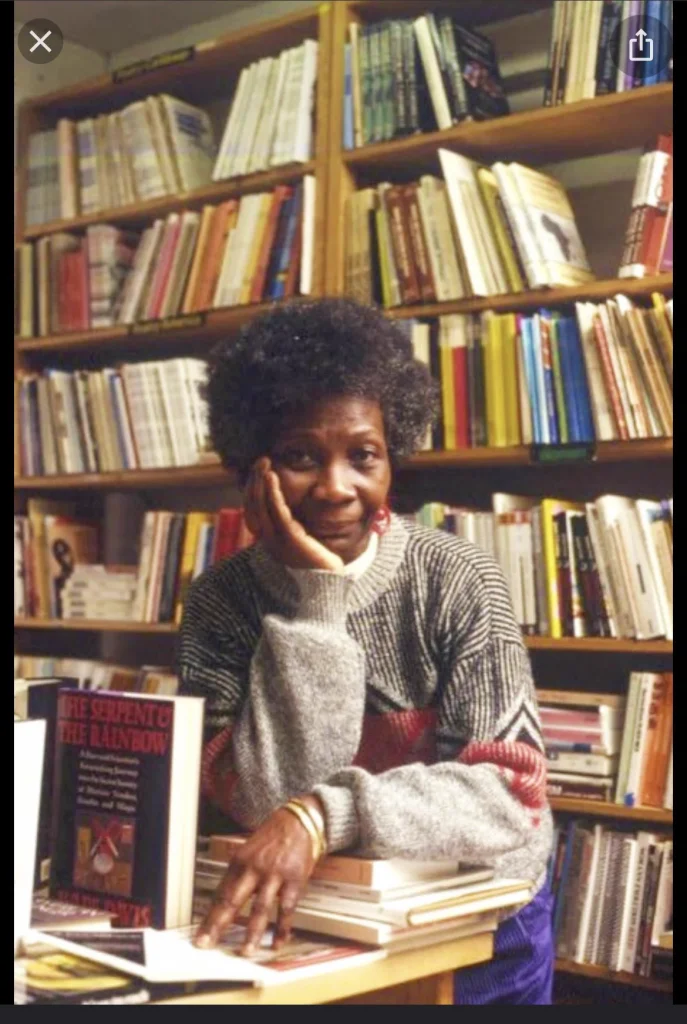
In the late 1960s the activist and publisher Jessica Huntley, who has died aged 86, co-founded the pioneering, London-based Bogle-L’Ouverture Publications (BLP) with her husband, Eric Huntley. Named in honour of two heroes of Caribbean resistance, Toussaint L’Ouverture and Paul Bogle, and deeply rooted in the concerns of the African diaspora, BLP began as a small, unorthodox, self-financing venture that brought a radical perspective to non-fiction, fiction, poetry and children’s books.
When, in October 1968, the Guyanese radical historian Walter Rodney was banned from re-entering Jamaica to resume his post at the University of the West Indies, after attending a conference in Canada, the Huntleys were among those who mobilised support in the UK.
The Huntleys relocated to west Ealing in 1972, their front room functioning as office and trade-counter until the council objected. A vacant site in a local cul-de-sac was instead set up as a bookshop, and – despite racist attacks on the building by the National Front – remained open for 18 years, renamed the Walter Rodney Bookshop in 1980 after his assassination. The bookshop became an informal drop-in advice centre and hosted poetry readings, book launches and schools’ workshops.
For more than a half-century Jessica participated in many grassroots struggles for racial and social justice; the Huntley papers, donated to London Metropolitan Archives, are a testament to the range of their concerns and activities. She was closely associated with community initiatives such as the Black Parents Movement, which campaigned against the controversial ‘Sus’ laws that allowed police to stop and search anyone on the suspicion of intent to commit an offence – with black youths believed to be particularly targeted; the Caribbean Parents Group; the New Cross Massacre Action Committee, which organised the largest-ever protest march of black Britons in the wake of the deaths of 13 young black people in a fire in south-east London in 1981; and the Keskidee Centre, Britain’s first Afro-Caribbean cultural centre.
Black History Month Events at Toynbee Hall:
Join us at Toynbee Hall for two captivating events celebrating Black History Month and saluting our sisters.
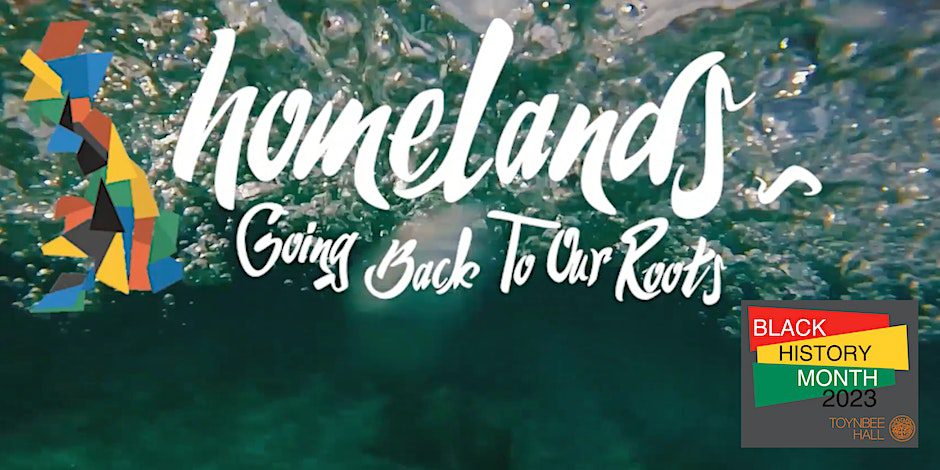
Homelands film screening
Wednesday 25th October, 6pm – 7pm
Join us for a special outdoor screening of ‘Homelands’, a culmination of a year-long project in which four acclaimed British urban musicians returned to their cultural roots, connecting with their homelands to create and produce new music.
Toynbee Hall, 28 Commercial Street, E1 6LS
Duration: 72 minutes
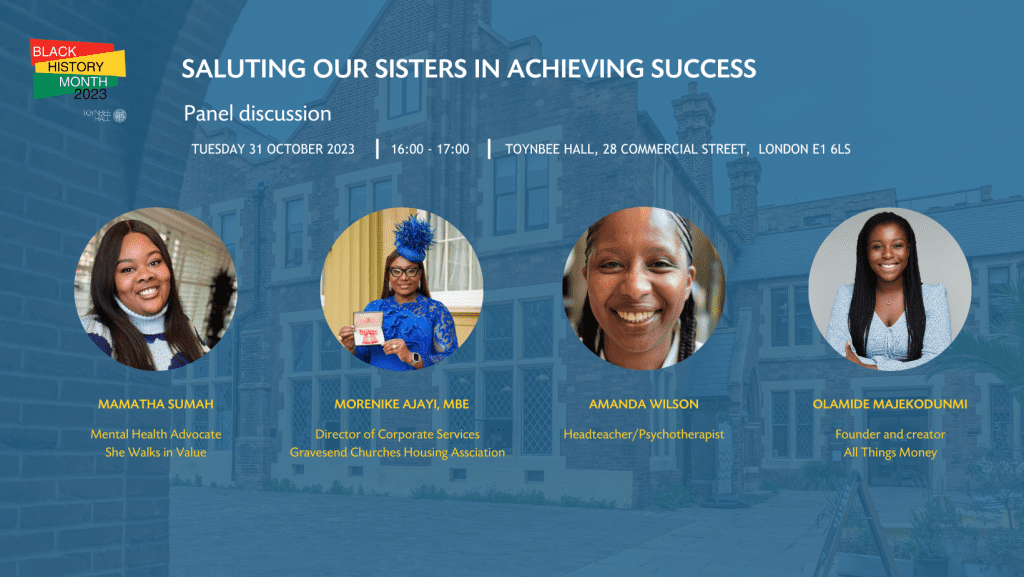
Saluting Our Sisters in Achieving Success panel talk
Tuesday 31st October, 4pm
Join us at Toynbee Hall for a panel discussion celebrating the achievements of remarkable women during Black History Month. We will pay tribute to the extraordinary sisters who have made a significant impact in various fields.
Toynbee Hall, 28 Commercial Street, E1 6LS































